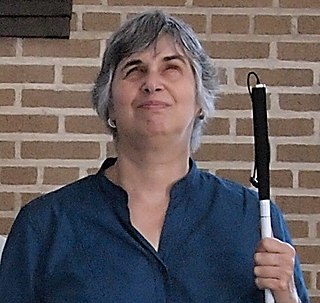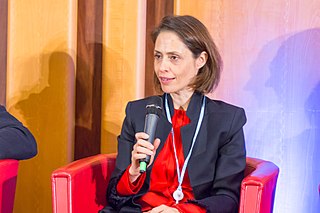
In medicine, triage is a process by which care providers such as medical professionals and those with first aid knowledge determine the order of priority for providing treatment to injured individuals and/or inform the rationing of limited supplies so that they go to those who can most benefit from it. Triage is usually relied upon when there are more injured individuals than available care providers, or when there are more injured individuals than supplies to treat them.
Bioethics is both a field of study and professional practice, interested in ethical issues related to health, including those emerging from advances in biology, medicine, and technologies. It proposes the discussion about moral discernment in society and it is often related to medical policy and practice, but also to broader questions as environment, well-being and public health. Bioethics is concerned with the ethical questions that arise in the relationships among life sciences, biotechnology, medicine, politics, law, theology and philosophy. It includes the study of values relating to primary care, other branches of medicine, ethical education in science, animal, and environmental ethics, and public health.
Medical ethics is an applied branch of ethics which analyzes the practice of clinical medicine and related scientific research. Medical ethics is based on a set of values that professionals can refer to in the case of any confusion or conflict. These values include the respect for autonomy, non-maleficence, beneficence, and justice. Such tenets may allow doctors, care providers, and families to create a treatment plan and work towards the same common goal. It is important to note that these four values are not ranked in order of importance or relevance and that they all encompass values pertaining to medical ethics. However, a conflict may arise leading to the need for hierarchy in an ethical system, such that some moral elements overrule others with the purpose of applying the best moral judgement to a difficult medical situation. Medical ethics is particularly relevant in decisions regarding involuntary treatment and involuntary commitment.

Life support comprises the treatments and techniques performed in an emergency in order to support life after the failure of one or more vital organs. Healthcare providers and emergency medical technicians are generally certified to perform basic and advanced life support procedures; however, basic life support is sometimes provided at the scene of an emergency by family members or bystanders before emergency services arrive. In the case of cardiac injuries, cardiopulmonary resuscitation is initiated by bystanders or family members 25% of the time. Basic life support techniques, such as performing CPR on a victim of cardiac arrest, can double or even triple that patient's chance of survival. Other types of basic life support include relief from choking, staunching of bleeding by direct compression and elevation above the heart, first aid, and the use of an automated external defibrillator.
Utilitarian bioethics refers to the branch of bioethics that incorporates principles of utilitarianism to directing practices and resources where they will have the most usefulness and highest likelihood to produce happiness, in regards to medicine, health, and medical or biological research.
The Declaration of Helsinki is a set of ethical principles regarding human experimentation developed originally in 1964 for the medical community by the World Medical Association (WMA). It is widely regarded as the cornerstone document on human research ethics.
Research ethics is concerned with the moral issues that arise or as part of research activities, as well as the conduct of individual researchers, and the implications for research communities. Ethical issues may arise in the design and implementation of research involving human experimentation or animal experimentation. Consequences for the environment, for society or for future generations must be considered. Research ethics can be considered as a subfield of applied ethics.

The Hastings Center is an independent, nonpartisan bioethics research institute and think tank based in Garrison, New York. It was instrumental in establishing the field of bioethics and is among the most prestigious bioethics and health policy institutes in the world.
The Johns Hopkins Berman Institute of Bioethics in Baltimore, Maryland, United States, is an interdisciplinary center serving the entire Johns Hopkins University and Health System. It is dedicated to the study of complex moral and policy issues in biomedical science, health care, and health policy. Established in 1995, the Institute seeks answers to ethical questions by promoting research in bioethics and encouraging moral reflection among a broad range of scholars, professionals, students, and citizens. Contributing to its mission are four divisions of the University: the Zanvyl Krieger School of Arts and Sciences, the Johns Hopkins School of Medicine, the Bloomberg School of Public Health, and the Johns Hopkins School of Nursing. Johns Hopkins was the nation's very first research university
Donal O'Mathuna is an associate professor within the College of Nursing at The Ohio State University.
Jonathan D. Moreno is an American philosopher and historian who specializes in the intersection of bioethics, culture, science, and national security, and has published seminal works on the history, sociology and politics of biology and medicine. He is an elected member of the National Academy of Medicine.
Ruth Macklin is an American philosopher and retired professor of bioethics.
Michael Alan Grodin is Professor of Health Law, Bioethics, and Human Rights at the Boston University School of Public Health, where he has received the distinguished Faculty Career Award for Research and Scholarship, and 20 teaching awards, including the "Norman A. Scotch Award for Excellence in Teaching." He is also Professor of Family Medicine and Psychiatry at the Boston University School of Medicine. In addition, Dr. Grodin is the Director of the Project on Medicine and the Holocaust at the Elie Wiesel Center for Judaic Studies, and a member of the faculty of the Division of Religious and Theological Studies. He has been on the faculty at Boston University for 35 years. He completed his B.S. degree at the Massachusetts Institute of Technology, his M.D. degree from the Albert Einstein College of Medicine, and his postdoctoral and fellowship training at UCLA and Harvard University.
Jamie Lindemann Nelson is a philosophy professor and bioethicist currently teaching at Michigan State University. Nelson earned her doctorate in philosophy at the State University of New York at Buffalo in 1980 and taught at the University of Tennessee at Knoxville and St. John's University before moving to Michigan State University. In addition, Nelson was an Associate for Ethical Studies at The Hastings Center from 1990–95 and is both a Woodrow Wilson Visiting Fellow and a Fellow of the Hastings Center. Nelson usually teaches courses on biomedical ethics, ethical theory, moral psychology, feminist theory, and philosophy of language.

Adrienne Asch was a bioethics scholar and the founding director of the Center for Ethics at Yeshiva University in New York City. She was also the Edward and Robin Milstein Professor of Bioethics at the Wurzweiler School of Social Work and Professor of Epidemiology and Population Health at Albert Einstein College of Medicine, which are both graduate professional schools at Yeshiva University. She also held professorships in epidemiology and population health and in family and social medicine at Yeshiva's Albert Einstein College of Medicine.
German Ethics Council is an independent council of experts in Germany addressing the questions of ethics, society, science, medicine and law and the probable consequences for the individual and society that result in connection with research and development, in particular in the field of the life sciences and their application to humanity. Its duties include informing the public and encouraging discussion in society, preparing opinions and recommendations for political and legislative action for the Federal Government and the German Bundestag as well as cooperating with national ethics councils and comparable institutions of other states and of international organisations.

Françoise Elvina BaylisFISC is a Canadian bioethicist whose work is at the intersection of applied ethics, health policy, and practice. The focus of her research is on issues of women's health and assisted reproductive technologies, but her research and publication record also extend to such topics as research involving humans, gene editing, novel genetic technologies, public health, the role of bioethics consultants, and neuroethics. Baylis' interest in the impact of bioethics on health and public policy as well as her commitment to citizen engagement]and participatory democracy sees her engage with print, radio, television, and other online publications.

Christine I. Mitchell is an American filmmaker and bioethicist and until her retirement in September 2022, the executive director of the Center for Bioethics at Harvard Medical School (HMS).

Vardit Ravitsky is a bioethicist, researcher, and author. She is president and CEO of The Hastings Center, a full professor at the University of Montreal, and a senior lecturer on Global Health and Social Medicine at Harvard Medical School. She is immediate-past president and current vice-president of the International Association of Bioethics, and the director of Ethics and Health at the Center for Research on Ethics. She is a Fellow of the Pierre Elliott Trudeau Foundation, where she chaired the COVID-19 Impact Committee. She is also Fellow of The Hastings Center and of the Canadian Academy of Health Sciences.

Eftychia ("Effy") Vayena is a Greek and Swiss bioethicist. Since 2017 she has held the position of chair of bioethics at the Swiss Institute of Technology in Zurich, ETH Zurich. She is an elected member of the Swiss Academy of Medical Sciences.







